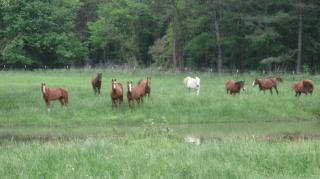Here is one of the best explanations of Coccidiosis I ever read
from BYC the other day
it was on "why do things keep happening"
keep this stored so when you have these questions read this good information
Far North Queenslander
New Egg
Many different diseases of chickens show identical symptoms which makes accurate diagnosis very hard
Coccidiosis is caused by coccidia (genus Eimeria), which are single celled parasites that live in the gut wall of their host. They are host specific: turkeys and other species are not infected by fowl coccidia and vice-versa. The different species of coccidia live in different parts of the gut and can be divided into those causing intestinal coccidiosis (the majority) or caecal coccidiosis (one species).
Coccidiosis Caecal Symptoms
In chicks or young birds, droopiness, huddling with ruffled feathers, loss of appetite, retarded growth, and bloody diarrhoea in early stages
It affects their cecum
Mortality is high
Spread from contact with droppings of infected birds. Spread on used equipment, feed sacks, feet o humans and wild birds
An important symptom is blood around the vent or bloody diarrhea
Coccidiosis Intestinal Symptoms
Affects growing or semi mature birds, droopiness, huddling with ruffled feathers, loss in interest in water and feed, retarded growth or weight loss, watery, moucousy, or pasty, tan or blood tinged diarrrhea, sometimes emaciation and dehydration
In mature birds; thin breast, weak legs, drop in laying, sometimes diarrrhea
If affects their intestinal tract
Mortality is limited to high
Spread from droppings of infected birds; spread on used equipment, feed sacks feet of humans and wild birds
An important symptom is blood around the vent or bloody diarrhea
Treatment:
1-teaspoon amprolium (20 percent) per gallon drinking water for 5 days (this is not an antibiotic)
A broad spectrum antibiotic to guard against secondary infections (yoghurt will restore the gut flora of the bird and make this more effective).
Follow this treatment with a multi vitamin supplement (especially A and K)
a regular dose of garlic in their feed also helps and is a great natural wormer.
Spread of the disease
Outbreaks are most common after wet weather or in damp conditions as it activates the oocysts in the soil.
Damp or contaminated litter and overcrowding favour its development.
Most commercial chick starters contain a drug that inhibits coccidiosis, but unless a clean, dry environment is maintained outbreaks can occur. Birds fed diets without preventative drugs are particularly at risk so clean dry litter and adequate space are especially important
If you have soil in your coop turn it, but dont allow dust to blow everywhere, as this will spread the disease. Sprinkling hydrated lime onto the soil and raking it into the dirt will help to eradicated the problem.
Coccidiosis is spread when one bird eats faecal material from an infected bird, which contains the infective stage of the coccidia (small egg-like bodies called oocysts). Oocysts are ingested when birds scratch and peck at the litter or consume contaminated feed or water. The oocysts in the droppings need moisture and warmth to mature before they can infect other birds, and can do so very quickly (24 hr). Oocysts can remain alive in poultry sheds for more than a year and are very resistant to most disinfectants.
Each oocyst breaks down in the gut to release parasites that multiply into thousands, damaging the gut and causing disease that may lead to the fowl's death.
Beginning five to seven days after infection, thousands of oocysts pass out in the droppings of the bird to continue the life cycle. It is impossible to prevent this spread unless birds are housed so that they have no contact with faeces.
Antibiotics dont cure Coccidiosis, just help stop the possibility of a secondary infection taking hold of your bird, which is often what ends up killing it.
--------------------------------------------------------------------------------







